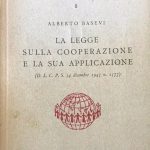Basevi Law
It’s the law n.1577 of 14th December 1947 that debates the cooperative world in a democratic and republican Italy, after a period of crisis and impasse of the sector because of fascism.
This Law recognises mutuality as a cooperatives’ linchpin (thus paving the way for a prohibition of transformation of cooperatives into capital enterprises) and it introduces tax benefits in accordance with certain restrictions (for example the prohibition of distribution and capitalisation of profits).
It was named after one of the most representative and qualified figures of Italian cooperation, Alberto Basevi.
On the website www.memoriecooperative you can read: “The Basevi Law was important for two main reasons. First of all it helped to set some essential basis for the development of the Italian cooperative movement, channeling it in a path of progressive growth. In that sense the law was able to solve at least partly one of the structural problems of cooperatives, common to this kind of enterprise in almost the whole world and that’s the “under-capitalisation”.
In this case, in fact, the ban of distribution (and privatisation) of incomes- substituted by a simple cancellation- meant that most of the management surplus could be reinvested in the enterprise, creating year by year and budget after budget a liquidity buffer that would be strategic for the business development.
The second reason why the Basevi Law deserves to be remembered is its equidistance from the principal political cultures of that time. As a matter of fact, in Italy in those years, most of the cooperative enterprises were based on a marxist or catholic or liberal democratic orientation. And on the basis of different values expressed by these ideologies, every cooperative organised itself independently, to point out a precise cultural compliance.
Alberto Basevi, drafter of the law at issue, had liberal ideas, but he worked on the text in agreement with some of the representatives of other political groups. In this way, the new law wasn’t representative of just one part but allowed all cooperators to recognise themselves in a vision of reference that they could later turn down on the bases of their own ideological beliefs”.



